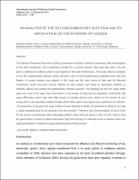| dc.contributor.author | Kakuba, Sultan Juma | |
| dc.date.accessioned | 2017-09-05T15:10:04Z | |
| dc.date.available | 2017-09-05T15:10:04Z | |
| dc.date.issued | 2011 | |
| dc.identifier.citation | Kakuba, S. J. & Saidi, M. A. (2011). An Analysis of the 2011 Parliamentary Election and its Implication on the Economy of Uganda. International Journal of Politics and Good Governance, Vol.2(2) | en_US |
| dc.identifier.issn | 0976 – 1195 | |
| dc.identifier.uri | http://hdl.handle.net/20.500.12309/484 | |
| dc.description.abstract | The National Resistance Movement (NRM) government transited to electoral democracy with promulgation
of the 1995 constitution. This constitution provides for a periodic election after every five years. This has
given a roadmap for political action to put Uganda on the road of democracy. This study makes an analysis
of the 2011 parliamentary election, which attracted a total of 1659 parliamentary candidates both male and
female. A content analysis was adopted in this study and the main source of data was the electoral
commission results document records. Method of data analysis was based on descriptive statistics to
interpret, discuss and analyse the parliamentary election outcome. The findings are that the ruling NRM
party won most of the seats; there was decline in the number of seats won by opposition. And female still
enjoy affirmative action seats with little inroads to directly elected seats, which are the domain of men
among others. But opposition political parties attract little support and register poor performance in election.
The conclusion is that given the huge number of seats obtained by NRM, the parliament is likely to turn into
a rubber stamping body for the demands from the executive. Therefore, the recommendation is that in order
for the citizens to be familiar with multi-polity politics, where electoral system is free and fair, there is need
for government to invest in political education right from primary to university level to enhance active and
equal participation in election through political parties of their choices. | en_US |
| dc.language.iso | en | en_US |
| dc.publisher | International Journal of Politics and Good Governance | en_US |
| dc.subject | Elections | en_US |
| dc.subject | Political Parties | en_US |
| dc.subject | Gender | en_US |
| dc.subject | Uganda | en_US |
| dc.subject | Economy | en_US |
| dc.title | An Analysis of the 2011 Parliamentary Election and its Implication on the Economy of Uganda | en_US |
| dc.type | Article | en_US |

